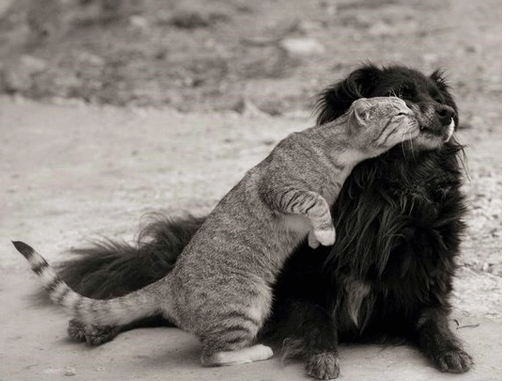
Animals Matter
by Amina Tharwat Abaza
Because they are creatures of God, like us they have rights.
Since I was a child I have always defended the weak and the helpless. Animals are the weakest of all God's creatures: they have no voice to speak; they have no hands to push away their oppressors. They can't decide for themselves, we decide for them and our decisions are not always the right ones.
In my culture as an Egyptian, they were gods.
In my life they were my only true, sincere friends.
In my values they are the real victims on this Earth. They didn't declare war, they don't have weapons, and they don't want to destroy humans, or impose religion.
Their only “crime” is that they exist.
Animals matter because they are mentioned in all religions, because they inspired many great authors, like Lafontaine and Colette. Julien Grack wrote about them: "Preter aux betes des lueurs d'humanite, c'est les degrader.” (Translation: "Lending the animals some of Human’s touch is degrading to the animals").
Animal rights is a part of women rights, children rights, minorities’ rights and handicapped rights. It is the duty of strong people to give back the rights to those who are weak.
Pharaonic Times
In Pharaonic times animals were placed in very high consideration and even deified.
Their place in society can best be summed up by the text found on a Stella 2200 years old (Late dynastic period) where the deceased owner proudly boasts: "I gave bread to the hungry, water to the thirsty, clothing to the naked, food to the Ibis, the Falcon, the cat and the jackal." The status of the cat was very elevated in everyday life and in burial chambers they are portrayed sitting on the tomb owner’s lap. The love of cats was carried to such an extreme that in the late era, even the unintentional killing of a cat was a crime punishable by death.
Dogs are frequently pictured as everyday household pet sitting, and were given personal names. This indicates the high status of the dog in ancient Egypt. The multitude of charming expressed and sympathetic renditions of animals found decorating the walls of the temples and tombs over many centuries clearly reflect a caring and respectful relationship with them. In addition the very gods themselves could appear in the guise of an animal.
In the ancient Egyptian view, humankind did not command as superior a position in creation over the animal kingdom. Instead there existed a "partnership" between Egyptian man and animal. The gods created both and both were bearers of life.
Therefore animals were entitled to respect and care.
Animals in Islam
What is written in the Kuran about animals?
Surat 6 Verse no 38: "There is no animal on the earth nor a being that flies on its wings, but communities like you. We have not neglected anything in the book, and then to their Lord shall they be gathered.”
Koran Surat 55 verse no 10: "And the earth he has assigned it to all living creatures"
What the prophet said: "Whoever is kind to the creatures of God is kind to himself.”
According to the teachings of Islam, the rights of animals and livestock in regards to their treatment by man are as follows:
1. He spends on them the provisions their kind requires, even if they have aged or sickened such that no benefit comes from them.
2. He not burden them beyond what they can bear.
3. He not put them together with anything by which they would be injured whether of their own kind or other species.
4. He slaughter them quickly, not before each other, never show them the knife and to kill them humanely without making them suffer. 5. He does not slaughter their young within their sight.
6. He put the males and females together during their mating seasons.
These teachings take us to our very recent and modern Five Freedoms for Animals.
1. Freedom from hunger and thirst
2. Freedom from discomfort, distress and sickness 3. Freedom from fear
4. Freedom to express their natural behavior
5. Freedom from pain.
This is the position of Islamic religion towards animals, but Muslim behavior is not exactly the reflection of this religion.
We have spoken about history: it is time to speak about the present.
The Main Problems in Egypt
1. Lack of legislation (Very few laws and very vague to protect animals)
2. Fear of being ridiculed if anyone uses the few laws to defend an animal.
3. The ignorance our worse enemy.
4. Massacre of the stray dogs and cats with Strychnine poison and bullets by the government authorities.
5. The barbaric practices in the slaughterhouses.
6. The tragic life of the fauna and flora of the Guizeh zoo.
7. The Massacre of the wildlife in Egypt
8. The tragic treatment of animals in Egyptian pet shops
9. The Circus
|